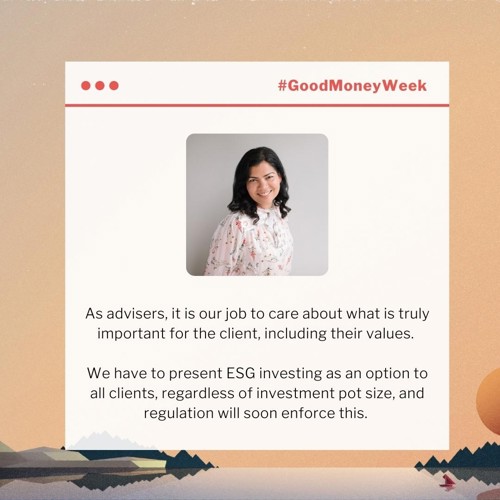We ran 3 workshops in Bristol, Barnsley and London with small groups of advisers and planners about incorporating ESG into their investment processes. It was lovely to be back with some familiar faces as well some new and it was a pleasure to be back in London for Good Money Week. It was fascinating to hear advisers’ experiences around the biggest challenges in discussing ESG with clients, as well as sharing best practice.
The 4 most valuable insights
1. Overcoming adviser bias
As individuals, we all have our own views, and it can be difficult to stop these from filtering into financial advice. We spoke to an adviser who is the only one in a team of 20 who has clients in ethical and ESG portfolios. But surely some of the 19 other advisers may also have clients with an ESG preference? Is the ESG-friendly adviser inadvertently encouraging some clients to invest in portfolios which may not be right for them?
Top tip: firms should collect information on what % of each adviser’s clients invest in ESG portfolios. This is especially important for larger advice firms. It can highlight outliers and show where there may be biases at play. You might find some advisers never mention ethical and ESG and others could be over enthusiastic.
2. No judgement here
We heard from advisers about how they raise the topic of ESG with clients. Many people won’t be familiar with Environmental, Social and Governance as an acronym or what it means. There was a feeling in our discussions that asking clients whether they care about ESG in a meeting could make the client feel pressured to say yes or they might feel like a bad person. Our recent poll with advisers showed performance is a key barrier in ESG investing and for some people where performance is their sole objective, sustainable investing might not be right for them. Other clients may not fully understand what ESG portfolios are or the biases that go hand in hand with ESG investing.
Top tip: it can be helpful to send a brief primer on ESG (a pamphlet or link to a video) to clients ahead of a face to face meeting. This gives the client breathing space to learn about ESG investing in their own time and then they can knowingly answer whether they’d like to learn more or not, without feeling judgement or pressure to say yes.
3. Sticking to the process
Some advisers and planners told us they feel overwhelmed when using ethical questionnaires. The client ticks a long list of things they want to have in their portfolio (e.g. renewable energy, AI) and another long list of things they want to avoid (e.g. nuclear power, animal testing, palm oil). This can leave advisers to research countless funds, each with their own mandate and objectives, to build a near-bespoke ethical portfolio for each client. This simply isn’t scalable and unlikely to lead to the best client outcomes if the portfolio construction isn’t done in a robust, risk-managed and consistent way.
Top tip: some adviser firms may wish to outsource building ESG portfolios to a specialist DFM. Adviser firms can research the options and agree a panel of ethical and ESG DFM solutions. The starting point for the client conversation is then to explain what solutions are offered and ask if it’s enough for the client. Chances are, the majority of client views can be met with a relatively standard solution. For those you can meet, a further conversation about a bespoke portfolio might be the next step.
4. We’re all accountable
Clients who care about ESG will want their money to be doing good – not just the money they invest into portfolios but also the money they pay to advisers, platforms and discretionary fund managers. All companies in the investment value chain need to be clear on their own practices. It’s a nice idea to publish a statement on this, to be transparent for potential customers as well as colleagues and suppliers.
We’re also on this journey at Parmenion and earlier this year we published our first “Responsibility Matters” statement, describing how we manage ESG issues from a broad business perspective, encompassing our clients, colleagues, suppliers and investment portfolios. You can read it here on our website.
As a part of Good Money Week, here’s what Cleona Lira, Parmenion Ethical Oversight Committee member had to say.

This article is for financial professionals only. Any information contained within is of a general nature and should not be construed as a form of personal recommendation or financial advice. Nor is the information to be considered an offer or solicitation to deal in any financial instrument or to engage in any investment service or activity.
Parmenion accepts no duty of care or liability for loss arising from any person acting, or refraining from acting, as a result of any information contained within this article. All investment carries risk. The value of investments, and the income from them, can go down as well as up and investors may get back less than they put in. Past performance is not a reliable indicator of future returns.



